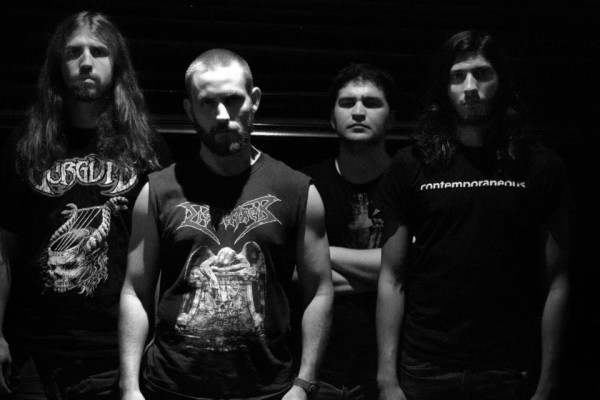(In this post, BadWolf interviews Doug Moore of Pyrrhon and brings us new Phyrrhon music, too. The fantastic photos accompanying this interview were taken by Caroline Harrison of Brooklyn Vegan. To see all of them, go HERE.)
Pyrrhon might be extreme metal’s best-kept secret; their sound is hard to pin down, but resides somewhere between Am-Rep style noise rock and progressive death metal of the most confrontational variety. The Brooklyn four-piece’s first album, An Excellent Servant But A Terrible Master, racked up a positive review in Decibel, and some powerful blog acclaim in 2011. This weekend Pyrrhon uploaded the third demo track from what will become their as-yet-unnamed second album for Selfmadegod Records.
I sat down to chat about Pyrrhon with vocalist and lyricist Doug Moore. It was hardly our first extended conversation. In the interest of full disclosure, I would proudly call Doug a friend since we attended Maryland Deathfest together last May. We both write on staff at InvisibleOranges and contribute to Stereogum.com—any prospective professional musicians would do well to read his industry analysis for a dose of healthy Schopenhauer-level sobriety. None of that changes my professional opinion of him, though.
Objectively speaking, Doug is a powerful vocalist and one of the best lyricists in contemporary metal, period. Our interview evidences his ferocious intellect, and personal dedication to extreme music.
Well let’s do the stupid casual shit first. How are things in Pyrrhon as of January 2013
Things are going well. We’re currently coming off a few months’ worth of downtime, thanks to an injury I sustained this past summer and our drummer Alex’s touring schedule with Malignancy. Currently we’re finishing up material for our second full-length, which we’re planning to record this coming April.
Right. Can you bring the readers and me up to speed on that injury? If you’re down to talk about it. I know the surgery laid you up for a hot second.
Sure. We played a show in August of 2012 with Origin [the photos in this article are from that show—BW]. The next morning, I woke up with pain in my right abdomen. The pain persisted for months, despite periods of rest, over-the-counter painkillers, and so forth. After bouncing around between various specialists, I was eventually diagnosed with a condition called a ‘sports hernia.’ Sports hernias aren’t well-understood or easily diagnosed, and the term itself is a catchall, like the term ‘sprain.’ In my case, it meant a weakness in my abdominal wall that was pressing against and irritating a nerve in my groin/hip region. It’s a common injury for hockey and football players, hence the name; it’s also common amongst woodwind/brass musicians and singers.
So basically, I screamed and thrashed around onstage hard enough to hurt my innards.
Someone in the comments is going to call that “Brutal.” And it is. But the hernia repair isn’t affecting your vocals as of yet, right?
Fortunately no, though I was worried about that when I went under the knife. I’m back up to full strength at this point. If anything, I’m more confident in my voice than I was before the injury.
You’re a pretty talented vocalist. How did you start doing metal vocals—where did you ‘find your voice’ as it were?
Thank you. It’s hard for me to say exactly when I started messing around with doing vocals. I started out as a guitarist in early high school, but I found the emotive aspect of metal vocals really attractive, and I fancied myself an okay writer, so I was interested in the lyrical side as well. I remember waiting for my parents to leave the house and then blowing my voice out by ‘singing’ along to Prowler in the Yard and Covenant in their living room.
Towards the end of high school, I got involved in a metal studio project called Seputus with my friend Steve, who’s an amazing drummer and guitarist. Since he was a better guitarist than I was at the time, I initially couldn’t contribute much more than riff/songwriting ideas and vocals. Getting better at vocals seemed easier than getting better at guitar or drums, so that’s what I ended up focusing on.
And how’d you get from Seputus to Pyrrhon?
Around the same time that I was getting involved with Seputus, I met Dylan, who would ultimately become Pyrrhon’s guitarist, through his sister. A few years later, we went to MDF together and talked about collaborating if the opportunity arose. Dylan later met Alex and Pyrrhon’s original bassist Mike in New York, where they all lived. He eventually invited me up to NYC for a tryout (I lived in Philly at the time).
For about two years, I commuted up to New York every week or so for practices and gigs. Eventually I moved here so I could devote more time and energy to the band.
Oh, I wasn’t aware that you moved to NYC for the purposes of Pyrrhon! So you really believed in the project pretty hard pretty fast, I take it.
Yeah, I really felt like we had something. Not the soundest life decision, perhaps, but I wasn’t about to pass up a chance to do something I’d always dreamed of doing in favor of a head start on middle age.
And yet, as positive as the critical response to Pyrrhon has been, you haven’t had the easiest couple years in terms of gig opportunities and record distribution, etc. Or maybe you disagree?
Well, we got off to a slow start; it took us a few years to figure out what we wanted to do musically. We’re also young, weird guys who don’t have the same number of scene connections that older or more sociable bands do. And our music is challenging stuff. I wouldn’t expect a band like ours to blow up instantly.
2012 was actually a good year for us, gig-wise. We played with a lot of great bands—Tombs, Origin, Hate Eternal, Dysrhythmia, 16, Malignancy, Serpentine Path, Drugs of Faith, Cleric, etc. Various non-band scheduling obligations kept us from touring, but we’re starting to work around them. And while Selfmadegod is a small European label, they did a great job promoting and distributing our full-length from 2011. It’s easy to find in online distros. Many bands have had worse luck.
At the end of the day, though, we’re just not a band that’s geared to make a big splash quickly. The Melvins put out three albums on some label called Boner Records before Atlantic woke up to them. Witch Mountain formed in 1997 but didn’t garner national attention until last year. I have faith that our music will find its natural audience eventually.
Challenging musically and lyrically. I think of you as an Arthur Von Nagel type—you write mostly about the real world, which is in and of itself sort of odd for a death metal band. Where does that stuff come from?
It’s hard to point to a single source of inspiration because I draw on as many parts of my life as I can. I spend a lot of time traveling around New York for work. I read a lot, from literary fiction to wonky political blogs to comic books. I try to remember my dreams, which are a great source for imagery. If you pay attention to the world around you, it’s easy to come up with stuff that’s worth writing about.
I guess I choose to focus on the real world because the real world dominates my internal monologue. The typical death metal stuff, Satan and zombies and vague war-themed imagery, strikes me as escapist fluff. In Seputus and on our first EP I wrote lyrics that dealt with that kind of thing, but I never felt those songs in my gut. When I’m lying awake in bed at night, it’s not because I’m worried about zombies or Satan; it’s because I’m worried about what’s going to happen to me and to the people I care about. We want to make intense music, so I choose subject matter that I have intense feelings about.
So what’s been keeping you up at night lately? I know you and I have spoken in depth about “Balkanize,” and the possibility of America splitting up—which seems itself a bit fantastic, though not escapist.
I hope you’re right about that. The prospect of a second American civil war isn’t at all out of the question, as I see it. Historically speaking, state dissolutions tend to happen very quickly and without much warning, under the right conditions. When Yugoslavia and Rwanda broke up in the 90s, the Western media narrative was all about their “simmering tensions” and “deep-seated ethnic hatreds.” In reality, the various ethnicities in those countries coexisted in relative peace for decades or centuries. The cultural gap between the US’s two political wings is at least as large, if not larger. Things could get out of hand very quickly.
There’s plenty of other stuff to worry about. The US’s security/surveillance state is growing under a president who originally ran on a promise to roll back his predecessor’s surveillance excesses. The internet and modern communications technology make it increasingly hard to differentiate between fact and misinformation. Those same technologies also tend to make people more passive, more reliant on consensus, and less likely to think independently about what’s going on around them. World population growth is continuing to cause resource-allocation problems, not to mention increasing the rate at which we’re trashing the environment. Misused medical technology is creating disease strains of unprecedented virulence (MDR-TB, for instance). Representative-democracy governments, which produce better results than any other governmental system than we’ve devised yet, just aren’t equipped to handle these sorts of problems. We’re heading for a big fall.
These things are all clichés, but that doesn’t mean they aren’t serious.
So, all of those subjects are going on Pyrrhon II? (related question: do you have a title?)
To some extent or another, yeah. Certainly all of those issues and more are on my mind and thereby affecting my mindset when I work on lyrics. Not all of them will be addressed directly, but some will. I try not to write too many songs that are really didactic or moralizing; I don’t think of Pyrrhon as a political band. Hopefully the personal side of what I’m doing will be just as apparent.
No album title yet, I’m afraid. We historically don’t title releases until the last minute. I think we came up with An Excellent Servant But A Terrible Master a few weeks before we tracked the album; we didn’t name Fever Kingdoms until the damn thing was mastered.
What exactly does “An Excellent Servant But A Terrible Master” refer to?
It’s an old truism—”the mind is an excellent servant but a terrible master.” We chose it specifically because it appears in a speech given by the writer David Foster Wallace to the graduating class of some university or another (can’t remember which). The speech is all over the internet [e.g., here] and it really nails a lot of the difficulties that people face in dealing with modern adult life; it should be required reading for every graduating college student. There’s a section that’s particularly germane to the lyrics on that album, so we named the record after it and quoted it in the liner notes.
So what is the… this is a bit of an amorphous question… but what is the goal of Pyrrhon’s sound? It doesn’t seem like the sort of thing people just come up with.
Well, we don’t have a set mission statement or anything, but I suppose we have some implicit goals. We want to develop a distinctive sound; too many metal bands are content to sound like someone else. We want to push our abilities to their limits and pursue ideas that others would shy away from. And we want to make music that will draw visceral, emotional reactions from people. At the end of the day, we’re a metal band, and we want to hit people in the gut as much as in the head. I suspect that most bands would answer this question the same way, but we try to take these things a little more seriously than most.
It’s almost too easy of a question. I ask it because in my mind Pyrrhon sort of falls halfway into two artistic movements or marketing trends. Sort of three. You’re a Brooklyn-based metal band with an organic sound, so there’s that scene. At the same time, one could loosely call you a tech-death or prog-death band. At the same time your affinity for Deathspell Omega and Dodecahedron, you know, avant-black metal bleeds in as well.
Yeah, I don’t think we fit comfortably into any particular sound or scene. We aren’t looking to belong anywhere. It’s a good thing in one sense, but it probably doesn’t help us from a business perspective. We’d be more marketable if we were easier to summarize in a press release.
I was talking with David from Kronos Quartet the other day, and he said something quite interesting, and I’m paraphrasing, but he said the most interesting cultural objects, more or less, are those that pop up in the cracks between categories.
That’s definitely true, and it explains a lot about Kronos Quartet’s success. It definitely holds for the metal world as well. Bands that play in pre-existing idioms can be really awesome, but there’s a certain ceiling for how exciting I can find them. The bands I love the most are the trope codifiers—bands that invented a popular approach, like Meshuggah or Neurosis or Suffocation—and one-of-a-kind freaks, like Dodecahedron or Giant Squid. Execution is really important, but only original ideas stand the test of time.
Let’s acknowledge the pink elephant, so to speak, you’re not just a musician you’re also a pretty prominent blogger. How do those two aspects of your life tie in?
I really try not to cross the streams any more than I have to. Writing about music and playing in a band express different parts of my personality. Analyzing music as a writer has influenced the way I think about writing music and vice versa, for obvious reasons, but each process is distinct in my head. I wish I’d taken on a pseudonym for one of the two, so that people didn’t associate writer-me with musician-me, but it’s too late for that now.
I’m sorry, is referring to this in the interview not kosher? Your call.
No, that’s fine. I get asked about it in every interview, haha. For good reason too. But hopefully that answer, if published, will deter some future people from asking me 9 questions about IO. I basically just don’t want it to become a distraction from the actual music
I’m a little surprised it comes up that much. Bloggers talking about blogging with other bloggers seems pretty redundant to me. And yes, I’m aware of the irony in me saying that to you.
I totally agree, it’s not what I’d ask about if I was interviewing me. But I think people tend to latch on to any easily-googleable factoid they can when writing interview questions, and saying “PYRRHON, THE GUY FROM INVISIBLE ORANGES’ BAND” is a lot easier than actually talking about what we sound like.
Ok smart guy. what WOULD you ask yourself?
Are you kidding me? I have no idea haha. Probably a bunch of nerdy questions about the compositional process. That’s my go-to.
My friend, I have no interest in your compositional process. Unless you do that thing everyone says mathy bands do and like, roll D&D dice in order to figure out the riffs.
Ugh, I wish it was that easy
That is the ONLY good answer to that question. Haha.
Sometimes I wish we did something more like that. Songwriting is like pulling teeth for us. I’d say we work on each song for about a month straight before it’s ready to go.
That’s funny, a lot of your jams sound much more organic than, say, a Dillinger Escape Plan song.
It’s hard to make really technical music sound organic! That’s one of the things we spend the most time on—trying to make the ideas flow in a way that’s actually possible for listeners to follow. We don’t want our songs to consist of arbitrary changes; we aim for a narrative arc. I think the main reason that people hate on technical death metal is because most tech-death bands have absolutely no regard for writing cohesive songs.
Well the best bands excel in that regard: we’re both big Death fans, and that was Schuldiner’s forte, I think. Don’t you guys play “Crystal Mountain?”
We trot that one out once in a blue moon. It was the first song we ever learned as a group. It’s been a little while since we last played it live; we’ve been developing the material for the second album for well over a year now, so we usually bust out originals that we haven’t played out instead. We’ve got enough songs for an EP after the album, and maybe we’ll record that cover and a few others for it.
Death is definitely a huge inspiration for us, in more ways than one. They were an incredibly inventive and challenging band who nonetheless wrote cohesive, memorable songs; we strive to do the same. Lyrically, too—starting with Spiritual Healing, Chuck’s lyrics dealt mostly with real-world issues, because that’s the stuff that moved him. I hope to engage people who hear our music in the same way that he engages people who hear his.
And yet, I see you as a very different frontman from Chuck. Full disclosure of course, I’ve never seen either of you perform, obviously, BUT in videos Chuck was very much a child of the 80’s, lots of flowing hair, rah-rah stuff. And I know you’ve called yourself a pretty confrontational frontman.
The specifics are obviously very different; Pyrrhon doesn’t sound much like Death either. But from my perspective, a lot of the core ideals are the same: challenge yourself, challenge your listeners, don’t hold back, be honest about who you are and what you think. I think a lot of death metal musicians use genre clichés as a way of hiding themselves, and we want to do the opposite.
So, when you’re onstage, what goes through your mind, in that moment?
Hard to say. It’s kind of like having a seizure—I don’t usually remember much of it after the fact. I try to focus on executing my parts correctly and on letting myself express the music physically. I’ve never felt totally comfortable with the frontman role, but it comes to me much more naturally now than it used to.
That’s a really common phenomenon—performance amnesia.
I’m not surprised. Performing that kind of music requires so much focus that there can’t be much mental horsepower left over for memory formation, especially when you’ve played the songs hundreds of times.
Just because this is a metal blog, and we expose music, what have you been rocking lately?
Hm…the new Virus EP (Oblivion Clock), Arkhon Infaustus’s Orthodoxyn, Kongh’s Sole Creation, Wooden Wand’s new one (Blood Oaths of the New Blues), and incidentally, Death’s Spiritual Healing.
Of course you stump me once. What the hell is Arkhon Infuastus?
Blackened death metal from France, big Immolation influence. Svart Crown is basically the same thing but not as good.
Them’s fighting words—a lot of people really like Svart Crown. Not me, though.
I love Svart Crown. But Arkhon Infaustus is better.
Unfortunately, I’ve got to go. Thanks for chatting, Doug.
Thanks for taking the time to talk to us. It looks like we’ll be recording in April, so expect a release date in late summer/early fall. We’re also planning on doing some out-of-town dates in the coming months, so keep an eye on our Facebook page for news updates.






“When I’m lying awake in bed at night, it’s not because I’m worried about zombies or Satan; it’s because I’m worried about what’s going to happen to me and to the people I care about. ”
Off course writing about zombies or Satan is fun, but more lyricists should write something real.
Great interview.